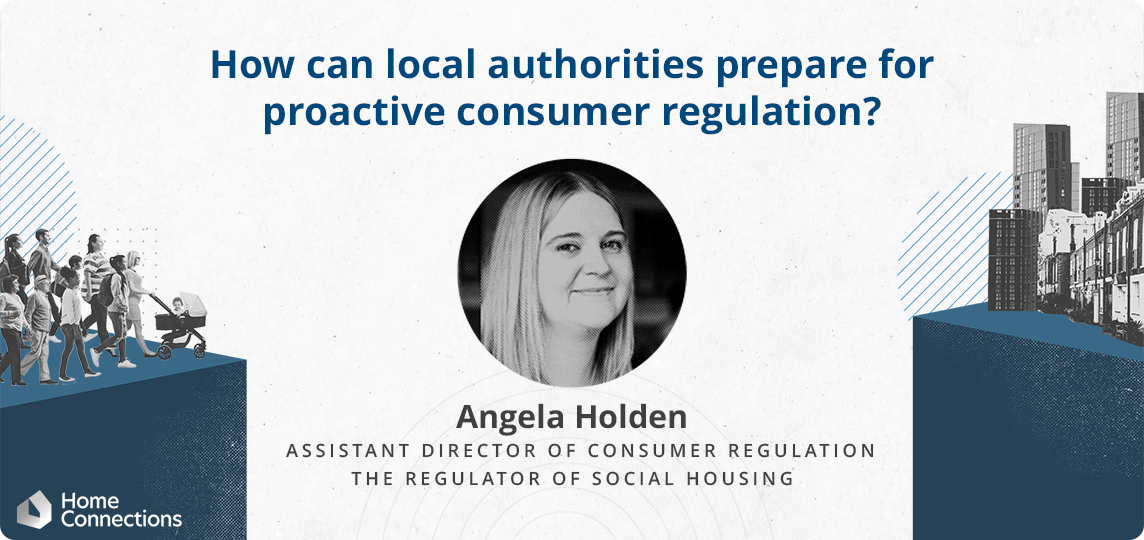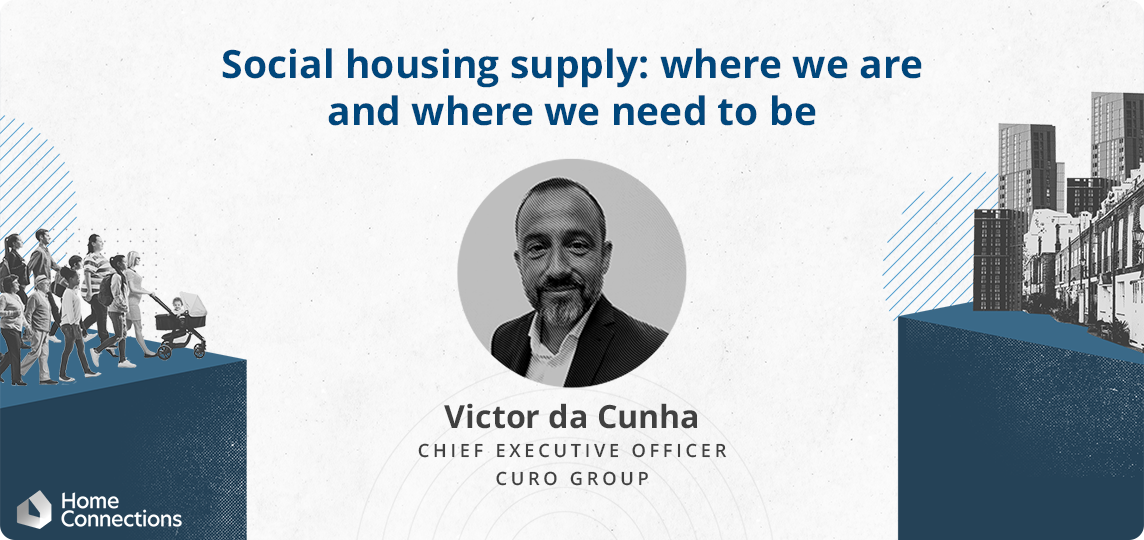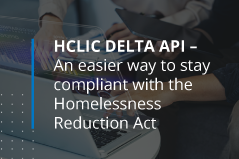How can local authorities prepare for proactive consumer regulation?

The Social Housing Regulation Bill is now in Parliament and it will change the way we at Regulator of Social Housing (RSH) regulate all registered providers – including local authorities with retained council housing.
The vision in the Bill is to recalibrate the relationship between tenants and landlords, with a focus on the safety and quality of homes as well as fairness and respect for tenants.
For us, this will mean a shift to proactive consumer regulation. At the moment we regulate consumer standards on a reactive basis. This means we can only investigate issues when they are referred to us. In the future all large registered providers, including local authorities, will need to provide evidence that they comply with our standards. And if registered providers don’t comply, we’ll take action. We’re in the process of updating our standards to align with the Bill and we will consult on the draft standards next year.
We’re already building constructive relationships with local authorities – not least through our current rent regulation which came into effect in 2020, and our ongoing reactive consumer regulation work. And it’s clear from our conversations with council executive teams across the country that there’s growing awareness of the Bill and the positive and important changes it will entail. We’re really grateful for all the useful insights, feedback and questions that local authority colleagues are giving us.
So how can local authorities prepare?
Here are some of the key questions to ask of your organisation now:
- As leaders, do you facilitate a culture where issues can be surfaced and solved rather than buried? Transparency and openness are central to the way we regulate, and they should permeate your culture too. We expect providers, including local authorities, to refer themselves to us when they find a potential breach of the standards. And we expect providers to put things right for their tenants promptly and effectively.
- Do you comply with our current consumer standards? Our 2022 Consumer Regulation Review sets out all the breaches to our consumer standards over the past year. It’s important reading for all providers, and reinforces the point that problems can occur in any organisation. Can you be certain your organisation is free of these issues?
- Do you have good, accurate data to evidence your compliance? We’ll want to see high-quality data on stock condition and health and safety compliance. We’ll also want to know how your organisation responds to tenants’ diverse needs. This means having data to know whether, for example, different groups are less satisfied than others, and the reasons for that. And, if so, having an action plan for improvement. Could you provide this if we asked tomorrow?
- Are you giving your councillors the right information to enable them to make strategic decisions and hold you to account? This comes back to culture and data – without transparency and accurate data management, how can council leaders and portfolio holders ensure good performance?
Proactive consumer regulation is coming and you have the opportunity to help us shape it. But it’s important that, where change is needed, you act now before running out of time.

Angela Holden
Assistant Director of Consumer Regulation at the Regulator of Social Housing
Angela will be joining us for our Connected Housing Webinar for her section "Social Housing Regulation Bill: Meeting demands, reshaping consumer legislation and delivering a positive complaints culture". The webinar will be held virtually on the 27th October 2022. Reserve your spot for free here.
Social housing supply: where we are and where we need to be

At a time when the country mourns the passing of a much-loved Queen and begins to sing ‘God save the King’, we are reminded that the only constant is change.
We have a new Government, a new Prime Minister and an entirely new Cabinet. Unsurprisingly, for the informed observer, we also have our twelfth Housing Minister in just 10 years and a substantial backlog of housing legislation to get through in short order, on planning, social housing regulation, decarbonisation, safety and ‘levelling up’, to name but a few.
Added to this, we have spiralling inflation, a deepening ‘cost of living crisis’ and a shortage of labour, materials and fuel. In many regions, there’s recognition that we have walked, open-eyed, over several generations into a national housing crisis. In some council areas, they’ve formalised this reality by declaring a housing emergency.
At today’s new build completion rates, it would take 126 years to build the housing needed for local people in some parts of the South West. House prices are now 10 times the average income across the entire region and Airbnb has all but destroyed the private rented sector in many coastal towns and villages.
How can we eradicate homelessness?
Given all of this, how can we eradicate street homelessness? How can we support keyworkers to live near their place of work? How do we fundamentally tackle the growing use of temporary accommodation and deal, once and for all, with the relentless build-up of people now waiting on Council lists?
Normally in an unpredictable economic environment, housebuilders will tend to stop building new homes and the Government might turn to Housing Associations to step up with their counter-cyclical model which allows them to continue to build even in a recession.
However, the environment is very different this time and Housing Associations aren’t as counter-cyclical as they once were. Four years of rent reductions are now being followed by a rent cap that is way below inflation. Years of Government policy on development and post-Grenfell costs have changed all that.
So, what does Government need to do to support housing building in this unpredictable and changing world?
Even under these tougher conditions there are answers, but we all need to be prepared to change too.
Join us!
I am keen to discuss, alongside Aileen Evans (Grand Union Housing) and David Bogle (Hightown Housing Association), what it takes to unlock social housing supply at Home Connections’ Connected Housing webinar. The webinar will be held virtually on the 27th October 2022. Book your tickets here. I hope to see you there!

Victor da Cunha
Chief Executive Officer at Curo Group
Do we need a Housing Minister?

Politics, right? You blink - a Housing Minister is out. You blink again - it's the Prime Minister's turn. The political turmoil that overtook Westminster in the past weeks has put the housing sector into a state of near-paralysis after the Housing and Levelling Up department was cleaned out following sackings and resignations. Will the new leadership truly commit to measures that will resolve the housing crisis?
20 Housing Ministers in 25 years
Stuart Andrew's resignation granted him the title of the shortest-serving housing minister since the role was created in 1997. At the Manchester Housing Conference, he committed to the 300,000 homes a year target. He also mentioned plans to encourage councils to build more homes, with an announcement to happen "very soon". Well, "very soon" never happened.
It's now up to the new 'new' Housing Minister, Marcus Jones, to take on the challenge. He will work alongside Greg Clark, who replaced Michael Gove as secretary of state for Levelling Up, Housing and Communities. Greg promised the "stability the housing sector needs to support and deliver the government's ambitions housing agenda".
But the housing sector is not so convinced and fears a huge step back in housing policies, including:
-
Abolishing Section 21 and improving the Private Rented Sector
-
Improving housing mobility for social housing tenants
-
Introduction of rent controls as cost of living crisis worsens
-
Building enough affordable homes
In the meantime, 30,000+ people in England have been on a social housing waiting list for 10 years or more
While new housing policies and reforms are put on hold until the Government sort its own mess, the housing crisis continues to spiral. After collecting freedom of information requests from 10 councils with the highest demands for council homes in England, The Big Issue revealed that at least 30,000 people across England are waiting 10 years or more for a social housing property.
Our national mobility scheme, Homefinder UK, offers a valuable move-on alternative for households and providers alike. Over 50 local authorities and housing associations engage with the service to prevent and relieve homelessness. So far, the scheme has rehoused over 1000 homeless households, including domestic abuse survivors.
Social activism is here to stay
The pressure on social housing providers is also increasing as social tenant activism is picking up. The name Kwajo Tweneboa now sounds familiar to a lot of housing professionals out there. The 23-year-old activist has become a voice for social housing tenants after exposing the poor living conditions of some social housing tenants across the UK using video recordings and social media platforms. His actions led the National Housing Federation and the Chartered Institute of Housing to launch an independent panel to help tackle poor-quality homes.
New departments, new processes?
And in the midst of it all, with the political changes and new agendas coming to the forefront, housing providers should expect processes to change. That's when flexibility and configurability can be a game-changer. We are proud to offer bespoke and integrated housing needs software that helps local authorities to keep up with all the changes. Just recently, our Homelessness Reduction Act software (hope) has launched a new integration service to allow housing professionals to submit HCLIC returns directly through our platform, replacing a manual upload to DLUHC's system.
What the housing sector needs is stability and a real commitment from the national Government to turn promises into reality - to solve the housing issues and to help communities across the UK to cope with the cost of living crisis. With or without a Housing Minister.
HCLIC DELTA API – An easier way to stay compliant with the Homelessness Reduction Act

For housing options officers, transitioning to the new HCLIC reporting requirements has not been an easy process since the Homelessness Reduction Act (HRA) was implemented in 2018.
According to the March 2020 evaluation of the implementation of the Homelessness Reduction Act, local authorities faced several challenges in staying compliant with the new legislation, including finding a suitable system that helps them meet the new requirements, including submitting the new HCLIC data reporting.
As the legislation approaches its 5th anniversary, Department for Levelling Up, Housing and Communities (DLUHC) is implementing a new method to automate the HCLIC data upload. Through a brand new HCLIC API, DLUHC will enable housing options officers to submit data directly to DELTA through their homelessness systems with minimal manual input. Some of the benefits include:
- Reduced burden and reliability on key staff who may not be available.
- Single point of data entry and amendments for local authorities.
- More frequent and timely data submissions to DELTA, hence any validation error reports can be more up-to-date, more manageable in size and easier to resolve.
- Earlier and higher quality data published, benefitting local authorities and central government to better highlight issues and monitor performance.
- Better data security.
Home Connections is proud to lead the way in integrating our Homelessness Reduction Act software, hope, with HCLIC API, taking user input on board and feedbacking them to DLUHC to ensure a smoother transition of submission methods. The integration is already live for our hope customers.
We are exploring the new HCLIC API integration in our upcoming hope webinar, to be held on 21st July, from 10-12pm. Details below:
Join our upcoming hope webinar:
How the new DLUHC API will automate HCLIC data submissions – making life easier for you
Thursday 21st July | 10am - 12pm | Zoom
At this webinar, you will:
- Hear from Cait Marlow, Homelessness Analyst for the DLUHC, on how this new approach will benefit local authorities, saving time and effort and reducing validation errors.
- See first-hand how Home Connections has led this implementation working in partnership with hope users and DLUHC, with an exclusive view of how the integration will work in practice.
- Share learnings and discuss solutions for current challenges experienced by local authorities across England.
This event has ended.
Home Connections and Revive Scotland will be exhibiting at CIH Scotland's Housing Festival 2022: Come and see us at Stand 80!

We are excited to announce, Home Connections will be exhibiting once again, alongside Revive Scotland, at this year's CIH Scotland's Housing Festival!
Scotland's biggest housing event is back for a live event in Glasgow this year. This is your opportunity to come together with fellow housing professionals from across Scotland for thought-provoking, inspiring sessions and face-to-face networking. See the full programme here.
This year’s conference will focus on:
- Housing to 2040
- Our housing system
- Housing futures
- Housing management
CIH Scotland's Housing Festival 2022
Date: 19-20th May 2022
Location: Exhibition Way Glasgow G3 8YW
Time: 09:00 - 17:00
Join as a member to attend the event
Already a CIH member? Secure your free place now: https://www.cih.org/events/shf-2022
Where can you find Home Connections and Revive Scotland?
You’ll find us at Stand 80. Come and visit Home Connections and Revive Scotland to discuss the current housing challenges facing the sector, including changes to national legislation. Talk to us about how we can collaborate to ensure your housing system is able to meet these challenges head-on, through flexibility and high functionality. All whilst providing choice for those in low-income households to find accommodation that suits them.
A new housing option for women experiencing homelessness due to domestic abuse
Do you have any applicants in desperate need of housing due to domestic abuse?
Launched in partnership between Homefinder UK and Wheatley Group, Revive Scotland is a free service that offers additional relocation options for women experiencing or threatened with homelessness due to domestic abuse. It aims to provide the best pathway to securing safe housing for these women. Here’s what two Revive Scotland movers had to say:
“I am so happy since moving to Glasgow. I have noticed a big difference in my kids. They are happy and sleeping well. They’re not waking up during the night scared. Now we have our own home, I feel we have lots to look forward to.”
“Thanks for making a difference in my life by giving me the support that I needed. This service should be put into place for all people experiencing domestic abuse as it gives them the opportunity to move on quickly, whilst knowing someone is at the other end!”
At stand 80, you will have the chance to discuss how you can make use of Revive Scotland's holistic approach to empowering women with an experience of domestic abuse. Secure your place at the Scottish Housing Festival today!
Home Connections statement on the Ukraine crisis

Dear Colleagues & Partners,
Home Connections is deeply concerned with the recent tragic developments in Ukraine. We stand with the Ukrainian nation against the aggression and growing humanitarian crisis caused by the Russian invasion.
We write to reassure you that we have no connections to, or relationships with, the Russian government or any significant Russian individuals.
We are a non-profit company registered in the UK with Companies House. We are wholly-owned and controlled by UK local authorities and housing associations, with no private owners.
We pay our taxes in the UK, and we are not registered in tax havens such as the British Virgin Islands or any other tax haven.
We also want to reassure you that we are ready to support you deal with any challenges that may arise as repercussions of the Ukraine crisis.
Kind Regards,
Ninesh Muthiah
CEO & Founder, Home Connections
Upcoming webinar: Connections Forum England

Our first Connections Forum of the year will take place on 13th April 2022. Focused on England, this free webinar is exclusive for housing professionals and representatives from local authorities. The event will explore best practice against homelessness and provide useful advice from housing experts, including Jo Beck from the Department of Levelling Up, Housing and Communities, to help you reshape your homelessness prevention services.
Jo will cover the importance of leadership in implementing the Homelessness Reduction Act (HRA) and highlight financial support available for local authorities.
Gain insights, network with peers and explore:
-
The importance of leadership in embedding the HRA
-
Funding available to support local authorities to end homelessness
-
Overcoming HRA challenges through adopting a bespoke homelessness case management software, hope
-
How to save thousands of pounds on Temporary Accommodation costs by using alternative move-on options
Learn from housing experts
Join our panelists for a discussion and Q&A about winning strategies against homelessness:
-
Jo Beck, Homelessness Advice and Support Team Manager, Department for Levelling Up, Housing & Communities (DLUCH)
-
Justin Haywood, Service Manager (Housing Solutions & Partnerships), Leicester City Council
-
Hamid Khan, Interim Transformation Lead for Homelessness, Brighton & Hove City Council
-
Mark Meehan, Chief Housing Officer at Hammersmith & Fulham
-
Ninesh Muthiah, Founder & CEO of Home Connections
Connections Forum England: Sharing best practice against homelessness
Wednesday 13th April | 10am - 12pm | Zoom
This event has now ended
HOPE for the future - Improving homelessness decisions through integrated HRA system

 It is not an easy task to keep up with the ever-changing rules (around eviction procedures, eligibility criteria, vulnerability, and so many other circumstances) housing officers must consider when making a homeless decision. Since we started Housing Reviews 20 years ago, we have helped local authorities to investigate homeless applications, providing advice on how to interpret the Homelessness Reduction Act (HRA) law and write legally sound (and fair) decisions.
It is not an easy task to keep up with the ever-changing rules (around eviction procedures, eligibility criteria, vulnerability, and so many other circumstances) housing officers must consider when making a homeless decision. Since we started Housing Reviews 20 years ago, we have helped local authorities to investigate homeless applications, providing advice on how to interpret the Homelessness Reduction Act (HRA) law and write legally sound (and fair) decisions.
Assessing homeless cases is extensive and labour-intense work. A good understanding of the legislation is not only needed - it is essential. I watch closely the Court of Appeal decisions on cases where housing applicants challenged decisions made by local authorities. In some cases, the outcomes from the appeals open precedents.
Let's look at the R(Mitchell) v. Islington LBC [2020] EWHC case as an example. It has been thought that issuing a not-in-priority-need decision (S184) was sufficient for a local authority to terminate an interim accommodation duty (S188(1)), provided to the applicant pending the outcome of their homeless application. The High Court, however, held that this was not sufficient. A local authority also must notify the applicant that it has decided that when its duty under S189B(2) comes to an end, it will not owe the applicant a duty under section 190 or section 193 of the 1996 Act.
On the day-to-day decisions work, local authorities review hundreds of cases. And that's where common mistakes or misinterpretations of the law might lead to challenges, appeals and review requests. Your homelessness system should, however, relieve some of the burdens.
Software to improve homelessness case management
Housing Reviews has a long-standing partnership with Home Connections. We co-designed hope, Home Connections' fully configurable HRA software, and provided over 100 up-to-date letter templates, built into the system. The system is intelligent enough to suggest the best letter for the decision you make at the assessment stage. They are your safeguard and protection, as it explains in detail your decision and its basis.
Since the implementation of the HRA, hope came a long way, with new features, but still very focused on guiding you through all the aspects of the legislation. The system checks if you are HRA/H-CLIC compliant and help you to notify applicants of your homeless decisions through the fully integrated letters suite.
I am keen to discuss the new improvements to hope, alongside Dave Anteh, Home Connections Senior Project Manager, at our talk “hope 2.0” at the Brighter Future Conference. Join us as we share how this new hope will support you to assess your homeless cases more efficiently while staying legally compliant.
Minos Perdios
Director of Housing Reviews Ltd
This event has now ended
Preventing homelessness for domestic survivors during and after COVID-19

 2020 was a hugely challenging year. We were told to stay at home, but home was not a safe place for all. With the national lockdown, I saw a dramatic increase in distressing calls from applicants who had experienced some form of domestic abuse. This was felt across other organisations. According to Women’s Aid, 81% of domestic abuse service providers experienced an increase in demand for telephone support.
2020 was a hugely challenging year. We were told to stay at home, but home was not a safe place for all. With the national lockdown, I saw a dramatic increase in distressing calls from applicants who had experienced some form of domestic abuse. This was felt across other organisations. According to Women’s Aid, 81% of domestic abuse service providers experienced an increase in demand for telephone support.
Refuges could not accommodate everyone due to limited capacity, with 57% of referrals been turned away in 2019 and 2020. Survivors were feeling trapped, fearful and helpless.
The Revive team continued to work alongside housing associations and DA organisations to assist the most vulnerable cases back into secure social housing across the UK. We also signposted them to relevant agencies to ensure they will continue to receive support in the new area. Consequently, despite the challenges, we managed to rehouse over 40 domestic abuse survivors outside of their local area during 2020.
Moving outside of local area
Unarguably, most social housing applicants are unwilling to relocate outside of their area - even if that means a safe, secure, and affordable home over homelessness. My ten years working in housing taught me there are many reasons for this. And whilst moving out-of-area is not a valid option for everyone, I have witnessed hundreds of examples of people who were open to the idea of relocating, and as a result, experienced a striking life improvement. For those fleeing domestic abuse, it was the chance to rebuild their lives and start afresh.
One domestic abuse survivor who was rehoused during the first national lockdown was a retired NHS nurse. She was sadly subjected to economic abuse at the hands of her own family. The situation deteriorated to the point where she was left homeless and forced to give her jewellery to her family.
After moving into a permanent social home through the Revive service, she said: “I have been in the property for two days, but my life and my mental health has already dramatically improved. It seems that once Homefinder UK knows about your situation, they activate a plan and apply it vigorously to ensure they find you a home as soon as possible.”
You can read the full story here.
UK Housing Awards recognition
In December last year, we were delighted that the prestigious UK Housing Awards recognised our hard work and positive impact on vulnerable people’s lives by being Highly Commended. Thanks to my team of case managers, which ensures that victims and survivors receive direct support and guidance throughout the property search process, something they are often too vulnerable to undertake on their own. I must also reiterate here the important role housing associations have had in helping us to provide support for domestic abuse survivors. Thanks to their commitment, partnership, and willingness to help, we have supported 130 households in just over three years into permanent social housing.
Our work has just started. And although a higher number of domestic abuse survivors will be given priority need for housing after the vulnerability requirement has been scrapped under the new Domestic Abuse Act, it’s important we find ways to prevent homelessness for this group in the first place.
I am looking forward to discussing how can we as a sector prevent homelessness for the domestic abuse survivors at the Brighter Future Conference on 14th of October. Our panel discussion will also receive insights from Hannah Gousy (Domestic Abuse Commissioner’s Office), Gudrun Burnet (Standing Against Domestic Abuse) and Yasmin Khan (The Halo Project). It’s an opportunity not to be missed!
Brenda Fraser
Homefinder UK & Revive Manager
This event has now ended
It's time to join forces to recover (and thrive) after the crisis
It doesn’t get any easier in the housing sector, does it? Along with health, housing has long been seen as the area of public policy affected by more changes in legislation, guidance and practice than any other. But the changes and challenges of the last couple of years have taken matters to new heights.
 Last year, ahead of the first lockdown, Campbell Tickell set up a WhatsApp group for housing chief executives. We had always been conscious that the position of a CEO is not an easy one. You are the key leader of your organisation, but you need to share and unload too, as you face up to real-life challenges. Where do you turn? Your Chair and Board members may not provide the engagement you need, however positive the relationships. It isn’t easy to share everything with your executive members who report to you. Many CEOs have coaches, but that role is different, and coaches are commonly sourced from outside one’s sector. What about other CEOs though? Especially when all are facing similar and directly comparable challenges – which was where we all found ourselves with the arrival of the pandemic.
Last year, ahead of the first lockdown, Campbell Tickell set up a WhatsApp group for housing chief executives. We had always been conscious that the position of a CEO is not an easy one. You are the key leader of your organisation, but you need to share and unload too, as you face up to real-life challenges. Where do you turn? Your Chair and Board members may not provide the engagement you need, however positive the relationships. It isn’t easy to share everything with your executive members who report to you. Many CEOs have coaches, but that role is different, and coaches are commonly sourced from outside one’s sector. What about other CEOs though? Especially when all are facing similar and directly comparable challenges – which was where we all found ourselves with the arrival of the pandemic.
Earlier in the pandemic, the group’s focus was inevitably on immediate issues such as:
-
Managing repairs and judging what was deliverable;
-
Keeping in touch with residents, especially the most vulnerable;
-
Mental health and wellbeing of customers and staff;
The group’s membership swelled and swelled, to 220+ CEOs of housing associations and ALMOs, drawn from right across the UK and into the Republic of Ireland. Perhaps as remarkable, the membership has remained at that level right up to the present. The amount of ‘traffic’ has inevitably reduced – over the first six to eight weeks of the group’s life, we were seeing up to 150 messages a day posted – but it remains active to this day, and for its members, an invaluable medium to share information, ideas and good practice. While the prevailing issues have shifted from those requiring immediate attention at the onset of the virus, the current topics demanding CEOs’ attention also require sustained focus and agility, and shared insight continues to be valuable.
Over recent months, attention has gravitated to longer term questions, and I’ll be talking about these at the Brighter Future Conference on the 14th October.
This group showcases much of what is best about the housing sector, with a willingness to share, collaborate, develop partnerships. In the early days of the pandemic, it led for instance to some joint purchasing of equipment and supplies. The ‘Media, Docs and Links’ section of the group’s feed is a veritable library of policies, procedures, action plans and best practice guidance.
Colleagues have recognised the value of sharing where there is no need to compete, but every need to work together. That must be one of the big takeaways from the way we have all had to face up to the pandemic, and find positive ways through it, in the interests of our customers, our staff, our local partners and our communities.
I’m looking forward to the Brighter Future Conference, when I’ll be sharing the view of housing leaders on what is next for the housing sector, and how reimagining, resilience and collaboration are the key tools for not only recovery, but to continue to progress.
Greg Campbell
Partner at Campbell Tickell
This event has now ended
The latest digest of discussions on CT’s CEOs WhatsApp group is at www.campbelltickell.com/2021/07/20/housing-ceo-whatsapp-group-digest-summary-19-july-2021/. Housing CEOs wishing to join the group are welcome to contact Greg Campbell or James Tickell.





